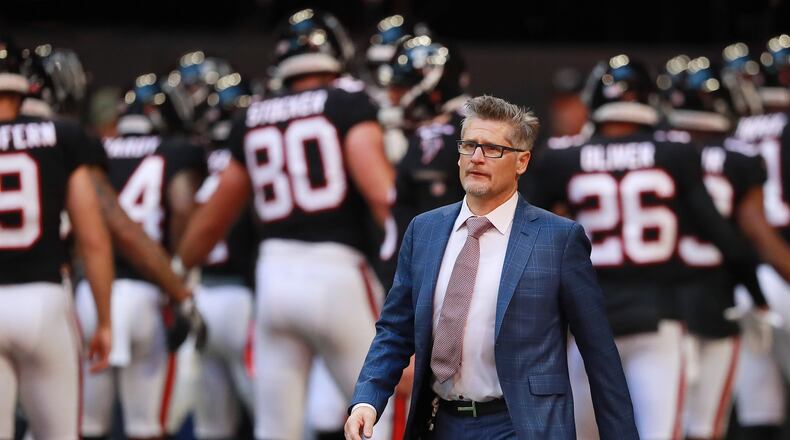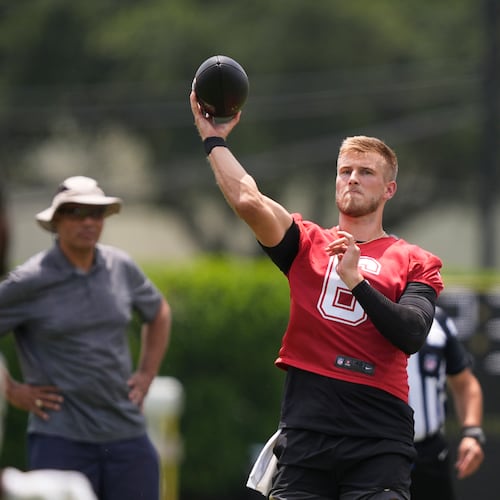Now that it is mandated that he work from home, Falcons general manager Thomas Dimitroff has not cleared out such luxuries as a bed or a kitchen sink to make room for the oversized draft board. He hasn’t broken any neighborhood covenants by parking a CIA-surplus satellite truck in the driveway as a backup in case the internet goes out. Not yet anyway.
Earlier this week Dimitroff uprooted his laptop during a media video conference and conducted a quick tour of where he’ll help mold the Falcons’ future come April 23-25.
Draft Central appeared to be a room off his home office that consisted of a couch and three TV screens mounted on one wall. A guitar rested in the far corner.
The place will be modified into a remote command center by the start of what is another very important NFL draft for a Falcons staff that needs to win to survive. The guitar likely won’t be there.
“Look, man, I got that guitar for Christmas and I love it,” Dimitroff said. “It looks good, but I haven’t learned to play it that well.”
He needs to hit all the right notes on this draft, regardless of how unwieldy it will be.
>> Georgian may be top tight end in draft | Best tight ends
In preparing for this scattered draft – where coaches and execs and scouts are confined to their homes by league fiat – Dimitroff and the Falcons have, like every other team, been forced to improvise.
For the past several weeks in this environment of isolation, the Falcons’ carbon footprint has been radically reduced. In the past, the team fact-finders could just hop on Arthur Blank’s private jet and conduct face-to-face interviews with a number of prospective draft picks on any given day and whim. These jaunts have been replaced by video conferences between players, Dimitroff, coach Dan Quinn and even occasionally a team psychologist measuring the makeup between the ears.
There are some limitations to not being able to take stock of a player in person, to not being able to “sniff the pits,” of these applicants, as Dimitroff colorfully puts it.
That said, seeing all the work they’ve been able to do from a distance, the Falcons might apply the experience of this spring to more normal years to come. Maybe they don’t need to rack up the air miles of an arctic tern to inspect every pimple of every player.
“We’ve been really active traveling around, and I don’t want to do away with it completely because there are some benefits,” the GM said. “Maybe after this we might be more particular about who we fly out to see.”
Dimitroff is coming off a free-agent signing period in which he added most notably a rush end (Dante Fowler), a running back with knee questions (former Georgia Bulldog Todd Gurley) and a tight end (Hayden Hurst, through trade).
None of the roster remodeling inspired waves of applause across the game. Typically, one of the national guys, longtime NFL writer and former ESPN analyst John Clayton, gave Dimitroff a C-plus for his work. And this is not a chap who got many low grades when back in school in Canada while his father was coaching in the CFL. “No, I don’t like C’s, that’s for sure,” he said with a laugh.
The next important opportunity to be graded and to upgrade a team that has gone 14-18 the past two seasons comes with the draft. Currently, the Falcons are picking 16th in the first round and hold six picks overall. The man can’t sit still those days, he shifts around like his drawers are two sizes too small, having done it in every draft since his first with the Falcons in 2008.
The deals can seem minor – trading two seventh-round picks for an additional sixth-rounder in 2018. They can seem monumental – a five-for-one deal with Cleveland to move up 21 spots in the 2011 first round to take receiver Julio Jones. Dimitroff has traded up in the fifth round to take defensive tackle Grady Jarrett in 2015. And he has traded up in the first round to get rush end Tak McKinley (2017). Win some. Lose some. Some are a tie.
With nobody in the same room and so many layers of added communication in place while the clock is ticking, the difficulties in striking such deals this time are obvious. Trader Thomas will be a little harder pressed to keep his streak alive.
“The scattered element of this is going to be complicated for some,” Dimitroff said. “I think there are going to be a lot more conversations and deals worked on in advance. Nothing set in stone, they’ll be conditional and circumstantial.
“I do that a lot anyway prior to the draft, that’s one of the reasons I probably feel comfortable moving in the draft,” he added, before paraphrasing Gen. George Patton (he gets extra credit for that).
“Prepare in times of peace and bleed less in war.”
Dimitroff is 53, but still looks unburdened by age. Stuck at home, he’s trying to get in an hour a day of cardio. While on a conference call, he can still get in some work with the exercise bands. He cuts a progressive figure in how he goes about researching players he wants to bring into the fold.
But this draft, he said, will skew a little more toward the elemental than the analytical. There will be more throwback to days of good old-fashioned scouting and game-film review. And Dimitroff seems very OK with that.
“We’re not going to have all the medicals on everyone. We’re not going to have all the information that maybe we’ve had in the past. We’re going to have to make decisions on people that we know maybe three-quarters of the information we need – at least think we need – like we've done in the past,” he said.
So, he is asked, what will be the difference-maker in this unique draft for a team to succeed?
“Teams that do well in this draft will have a very solid and sound personnel system set up,” Dimitroff said. “It comes back to some old-school scouting elements. You better have an adept scouting staff in place, you better have your t’s crossed and your i’s dotted with a lot of the underclassmen as well as the potential undrafted people.
“It’s the preparation, it’s having a very good and sound personnel system. And being prepared with the technology, the systems put in place, that’s going to be a really important piece.
“Teams in front of it should be able to draft well. They could draft well if it was moved up 10 days.” The presumption being that the Falcons are one of those teams.
Right now, in addition to real concerns, there are odd questions and odder scenes playing in the general manager’s head.
How many tech people does he really want around his house setting up the tools he’ll need to keep current during the draft? “I have this vision of five guys with hazmat suits wandering around,” he said.
And he finds himself even thinking, only semi-seriously, of “trying to dissuade the fan base from heckling outside on the sidewalk.”
Wherever Falcons fans are sheltered during the draft, they will care not one whit about how weird and challenging the process has been. They will not care if Dimitroff is drafting from a survivalist’s underground bunker. They only care that he hits on the majority of his picks and that their team breaks free from the bonds of mediocrity.
No excuses. This most unusual draft has to pay off.
“And I wouldn’t want that any other way,” the GM contended.
About the Author
Keep Reading
The Latest
Featured



